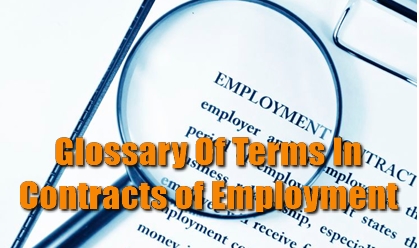Length of contract: the most common form of contract of employment is a permanent contract, which continues indefinitely, subject to either party giving notice. However, many people are employed under fixed term contracts. These are generally contracts of employment which from the start will end after a fixed length of time, for instance if you take on a three year tenancy you might appoint a manager for the three years of the tenancy only. Sometimes, however, such contracts may be end on completion of a particular task, say for instance to manage the pub during the maternity leave of your existing manager.
The Fixed Term Employees (Prevention of Less Favourable Treatment) Regulations 2002, is meant to ensure that employees on fixed term contracts have similar employment rights to employees on permanent contracts and are not treated less favourably with regard to their terms and conditions of employment, including pay and benefits. So you can’t have one set of rules for permanent staff and another for “temporary” staff.
Notice: a very important contractual term is the length of notice which either party must give to bring the contract to an end lawfully. Length of notice is also governed by statute (see below for statutory minimum notice periods). In the case of fixed term contracts, these often will not contain any notice provisions, but instead, will come to an end when the fixed term expires. However, it is still possible to have a fixed term contract with notice provisions. In such a case the employment may be ended before the end of the fixed term by either party giving the correct notice.
Pay in Lieu: in addition to setting out the length of notice to bring the contract to an end, well drafted contracts of employment will also say whether or not the contract can be terminated by making a payment in lieu of notice and may also specify what this must constitute.
If a contract states that a payment in lieu of notice may be made on termination, the contract can be ended lawfully by making a payment to the employee instead of giving the employee notice and allowing him/her to work it. The advantage of this is that any terms of the contract which are intended to continue after employment has ended for example, worries about cash or stock losses might make it more sensible to pay in lieu than allowing that member of staff to continue in place until their notice has been worked.
If there is no payment in lieu clause, you can still make a payment in lieu instead of giving notice, but legally such a payment constitutes damages for your breach of the contract and that member of staff will no longer be bound by any of the terms of the contract.
The presence or otherwise of a payment in lieu clause also dictates whether or not payments in lieu of notice are taxable. A payment made according to a payment in lieu clause is taxable whereas a payment which is made as damages for a breach can usually (although not always) be made tax free. You would need to check with your lawyer and accountant for clarification on specific cases.
Job title: a contract will usually include the employee’s job title and may also indicate some of the employee’s duties and responsibilities. More often a detailed description of duties and responsibilities will be contained in a separate non-binding job description. It is good practice for to include a “flexibility provision” in the contract of employment which makes it clear that the items set out in the job description are not set in stone and that your staff may be asked to carry out other duties from time to time or their duties may be changed, within reason, in future.
Place of work: a contract must contain a description of the employee’s place of work. Often employees are required to travel for the purposes of their employment and it is helpful for employers to state this in the contract of employment. For instance you might be running more than one pub or you may have an outside bar/catering business operated out of the pub.
A common “issue” that arises for employers is whether they have the power to move staff from one office to another in the event of relocation a way of dealing with this is to include a “mobility clause” in your contracts of employment. This has the advantage of making it clear to all the parties that staff may be relocated to work elsewhere, perhaps within a specific area. Sometimes such clauses will go on to specify that relocation expenses may be paid if relocation takes place.
Hours of work: another extremely important area of a contract of employment are provisions which relate to the hours staff are expected to work. Sometimes staff will have set fixed hours and will not be expected to work outside these hours, (for instance a morning cleaner or breakfast chef). Sometimes employees may be expected to work outside their normal working hours, but will be paid to do so (for instance bar staff working a private function bar that is open longer than the main pub bar).
Continue reading … page 2
